 Armenia can competitively satisfy the needs of electronic companies seeking to more cost effectively serve customers in Europe, while positioning themselves to exploit new and expanding opportunities in Russia and other CIS countries.
Armenia can competitively satisfy the needs of electronic companies seeking to more cost effectively serve customers in Europe, while positioning themselves to exploit new and expanding opportunities in Russia and other CIS countries.
Literally, at the crossroads of East European, West Asian and Middle East markets, Armenia's commanding position in further enhanced courtesy of tariff free access to CIS markets. The average annual growth of real wages between 1999 and 2005 was 11% but coming from such a low base, the Armenian labor force will remain highly cost competitive for many years.
The Armenian precision engineering and electronics sectors accounted for 30% of total industrial production and represented a center of excellence within the former Soviet Union. Those days are past but the legacy, in terms of the skills base and intellectual capital, is sufficient to trigger a renaissance of the electronics and precision engineering sectors in Armenia with foreign direct investment representing an important catalyst.
Hard facts:
- Armenia hosts around 30 electronic and precision engineering companies that employing over 6,000 people, 70% of whom are skilled and a further 26% semi-skilled;
- At its peak, the electronics and precision engineering sectors employed 30 000 people generating annual revenues in average of $300 million;
- Armenia was particularly strong in both the design and manufacture of active and passive components, along with telecommunication, electrical signal and audio / video electronic equipment;
- Out of 8,000 technology students, around 6,000 are studying at the State Engineering University of Armenia (SEUA) and nearly 2,000 at Yerevan State University (YSU), underpinning combined graduate output of around 1,900 in 2004;
- The customs regime is sufficiently well developed to support ‘inward processing relief’ transactions to effectively serve customers throughout Europe and in the case of the Russian market, Armenian manufactured goods are treated as domestic products;
- The average net monthly salary, within the sectors, in 2004 was $60;
Almost all the electronic and precision engineering companies have retained their own in-house R&D labs. The R&D situation within most of Armenia’s academic institutions is also impressive. Essentially, they can be categorized in three groups: The institutions operating within the structure of the National Academy of Sciences; Research departments within the structure of Yerevan State University; and Research departments within the structure of the State Engineering University of Armenia.
 YSU - Yerevan State University hosts a major research facility - “Laser Technology Research and Production” – along with 26 scientific labs focusing on astrophysics, radio physics, solid-state physics and physical chemistry. Currently, YSU has collaborative agreements with 58 universities in 23 countries including the United States (Fresno, Riverside, Michigan, Northeastern and George Mason); France (Montpellier, Lyon, Marseilles and University of Paris); United Kingdom (University of London) and Germany (Rostock University).
YSU - Yerevan State University hosts a major research facility - “Laser Technology Research and Production” – along with 26 scientific labs focusing on astrophysics, radio physics, solid-state physics and physical chemistry. Currently, YSU has collaborative agreements with 58 universities in 23 countries including the United States (Fresno, Riverside, Michigan, Northeastern and George Mason); France (Montpellier, Lyon, Marseilles and University of Paris); United Kingdom (University of London) and Germany (Rostock University).
SEUA – State Engineering University of Armenia
With extensive campuses in Yerevan, Gyumri, Vanadzor and Goris, SEUA provides majors in 63 disciplines and hosts several advanced and extensive R&D facilities including: Mathematical simulations and computer aided design; Fiber optics communications; Powder metallurgy and plating; X-ray diffraction of material structure analysis; Neutronal nets; Photoactive and semiconductor parameter measurement; Boundary value problems of differential equations; Tenzo-semiconductive transducers; and Small power systems.Through the TEMPUS TACIS program and directly, SEUA has established an impressive list of partner universities and centers of excellence throughout the world. Courtesy of a collaborative agreement with the Lycos Company and the Enterprise Incubator Foundation, SEUA established an ‘Internet Technologies’ scientific educational center and introduced a new specialized Bachelor’s degree.
Coming to the exports trends of these sectors, during last 4 years it has been registered on average more than 120% annual growth rate, while in 2004 the growth rate of these sectors was 27.6%.
For more information see the ADA's publications "Electronics Industry in Armenia" and "Precision Engineering Industry in Armenia" provided in PDF format.
Key sectors:
IT, Electronics and Precision Eng., Mining, Energy, Fine chemicals and pharmaceutecal, Jewelry and diamonts, Textiles and Closing, Food and drinks, Tourism
